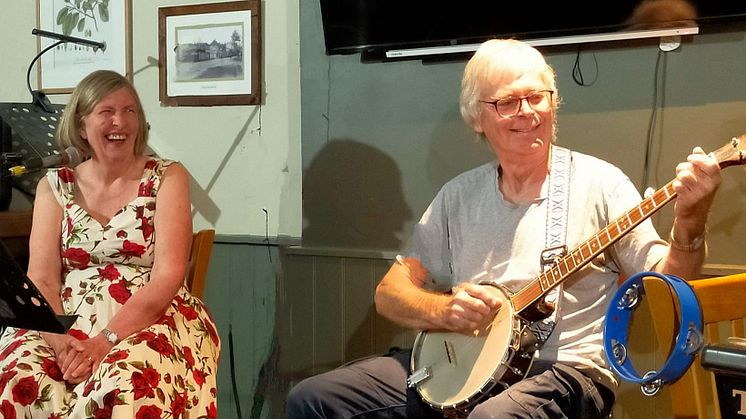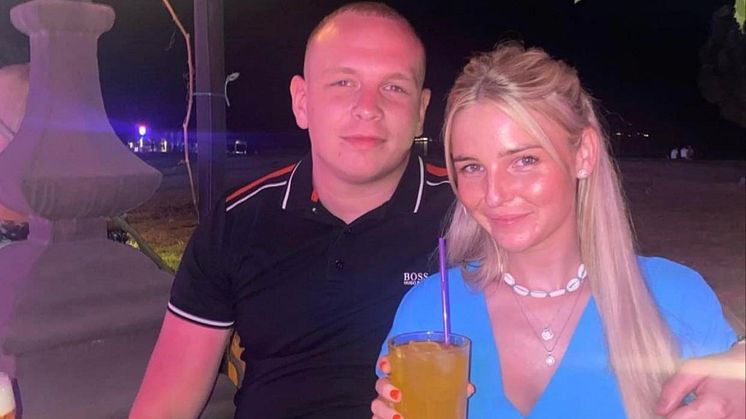
Press release -
Gillingham man’s love of music helped him rebuild his life after a stroke left him unable to speak properly.
A Gillingham man’s love of music helped him rebuild his life after a stroke left him unable to speak properly.
Retired engineer Graham Anstee, 75, woke at home one morning to find that he couldn’t remember the names of his family, but he could still play the banjo, which he teaches.
He’s sharing his story in support of the Stroke Association during Stroke Awareness Month to highlight the positive impact music and singing can have for stroke survivors.
“I’m retired, physically fit, active, and generally well,” said Graham. “I went to bed a bit earlier one night, as I wasn’t feeling too good. When I got up the next morning, I was feeling fine, but soon realised I couldn’t remember anybody’s names, which was quite a frightening experience. I couldn’t remember my wife Josie’s name or those of my children, Charmaine, Natasha and David.
“I made breakfast as usual and knew where things were, no problem. I played my banjo which was fine and all off by heart. At some point, I found that I couldn’t read words, letters, and numbers. I just didn’t know what they were. I couldn't string words together either. My understanding of them had gone completely.
“I couldn’t understand the loss of my memory with certain things and yet how I could still play my banjo. I was bewildered by that. They say it’s muscle memory, but I don’t know.
“My wife and daughter thought I might have had a stroke and so took me to Maidstone hospital. I didn’t have any typical symptoms of stroke but, after tests, a stroke was confirmed.”
Graham’s stroke, which happened last September, is likely to have been due to high blood pressure. An earlier stroke in 2019 affected his eyesight,
Graham counts himself fortunate that there were no other physical disabilities from this latest stroke and that his memory did start to come back, although he still has some difficulties with reading and writing.
He said: “At first when I started to look at my music I couldn’t understand the words or the way that the musical notation was put together.
“It gradually came back over a six-week period and I’m now back teaching again - I haven’t lost any of my teaching ability. The occupational therapist said it would continue to get better too.”
As well as teaching the banjo, Graham plays for Bishop Gundulf’s Morris dancers and for an Appalachian dance teacher in Faversham. He also takes part in folk music sessions and local folk festivals.
He said playing his banjo had been excellent therapy after his stroke; “Emotionally, it’s always at the back of my mind that I might have another stroke. The music has helped me as I can sit indoors and play by myself, which is quite relaxing and takes my mind off all kinds of things. If I had come home and not done anything, I would have got very depressed - I couldn’t imagine that.
Graham was supported by Jess from the Stroke Association’s Medway and Swale Stroke Recovery Service. This offers stroke survivors opportunities to regain confidence and independence, helping them to rebuild your life after stroke.
A recent survey by the Stroke Association’s survey found that over half of stroke survivors said that singing, listening to music or playing an instrument had a positive impact on their stroke recovery, with two in five saying music had a massive impact on their recovery.
The Stroke Association is encouraging people to raise their own voices to help stroke survivors get the vital support they need after the devastating impact of a stroke. The charity has launched Sing4Stroke, a new fundraising initiative, where people can sing wherever they like - at home, on a live stream, at the office, at school or organise their own event, to raise vital funds to support stroke survivors and their families.
Nick O’Donohue, the Stroke Association’s associate director for the South East, said: “Every day in May, 240 people will wake up to the catastrophic impact of a stroke. It can leave survivors unable to move, see, speak, or even swallow. With strength, determination and the right support, recovery is possible.
“The Stroke Association is the only charity in the UK providing lifelong support for all stroke survivors and their families.
“We provide tailored support to tens of thousands of stroke survivors each year, funds vital stroke research, and campaigns to secure the best care and support for everyone affected by stroke.
“By raising your voice for stroke survivors this May, you can help stroke survivors like Graham and their loved ones to find strength through support. Sign up to Sing4Stroke at www.stroke.org.uk/singing
Topics
Categories
Over 90,000 people survive a stroke every year in the UK, but surviving a stroke is just the start of a long and traumatic battle to finding their way back to life.
The Stroke Association is the only charity in the UK providing life-long support for all stroke survivors and their families. We provide tailored support to tens of thousands of stroke survivors each year, fund vital scientific research, and campaign to bring the best care and support for everyone affected by stroke.
Anyone affected by stroke can visit stroke.org.uk or call our dedicated Stroke Support Helpline on 0303 3033 100 for information, guidance or a chat when times are tough.


